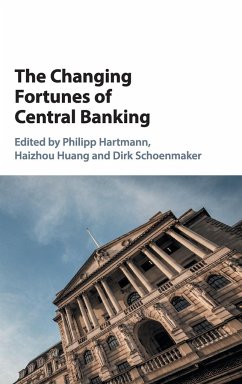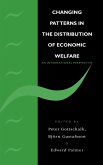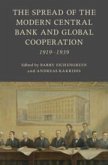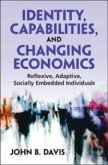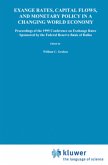The Changing Fortunes of Central Banking
Herausgeber: Hartmann, Philipp; Schoenmaker, Dirk; Huang, Haizhou
The Changing Fortunes of Central Banking
Herausgeber: Hartmann, Philipp; Schoenmaker, Dirk; Huang, Haizhou
- Gebundenes Buch
- Merkliste
- Auf die Merkliste
- Bewerten Bewerten
- Teilen
- Produkt teilen
- Produkterinnerung
- Produkterinnerung
Contains 22 essays by leading luminaries in policy making and research, illustrating the changing role of central banks and the policies they pursue in seeking monetary and financial stabilisation.
Andere Kunden interessierten sich auch für
![Changing Patterns in the Distribution of Economic Welfare Changing Patterns in the Distribution of Economic Welfare]() Peter Gottschalk / A. Gustafsson / Edward Palmer (eds.)Changing Patterns in the Distribution of Economic Welfare130,99 €
Peter Gottschalk / A. Gustafsson / Edward Palmer (eds.)Changing Patterns in the Distribution of Economic Welfare130,99 €![The relationship between the money supply and the inflation rate and the role of the European Central Bank in changing the money supply The relationship between the money supply and the inflation rate and the role of the European Central Bank in changing the money supply]() David HörnleThe relationship between the money supply and the inflation rate and the role of the European Central Bank in changing the money supply18,95 €
David HörnleThe relationship between the money supply and the inflation rate and the role of the European Central Bank in changing the money supply18,95 €![The Spread of the Modern Central Bank and Global Cooperation The Spread of the Modern Central Bank and Global Cooperation]() The Spread of the Modern Central Bank and Global Cooperation110,99 €
The Spread of the Modern Central Bank and Global Cooperation110,99 €![Identity, Capabilities, and Changing Economics Identity, Capabilities, and Changing Economics]() John B DavisIdentity, Capabilities, and Changing Economics111,99 €
John B DavisIdentity, Capabilities, and Changing Economics111,99 €![Early Stage Investments in New Technology Based Firms - Analyzing the Changing German Landscape of Venture Capital Finance in the Light of Capital Market Theory and New Institutional Economics Early Stage Investments in New Technology Based Firms - Analyzing the Changing German Landscape of Venture Capital Finance in the Light of Capital Market Theory and New Institutional Economics]() Fritz Holger LudewigEarly Stage Investments in New Technology Based Firms - Analyzing the Changing German Landscape of Venture Capital Finance in the Light of Capital Market Theory and New Institutional Economics52,95 €
Fritz Holger LudewigEarly Stage Investments in New Technology Based Firms - Analyzing the Changing German Landscape of Venture Capital Finance in the Light of Capital Market Theory and New Institutional Economics52,95 €![The Changing Postal Environment The Changing Postal Environment]() The Changing Postal Environment104,99 €
The Changing Postal Environment104,99 €![Exchange Rates, Capital Flows, and Monetary Policy in a Changing World Economy Exchange Rates, Capital Flows, and Monetary Policy in a Changing World Economy]() Exchange Rates, Capital Flows, and Monetary Policy in a Changing World Economy77,99 €
Exchange Rates, Capital Flows, and Monetary Policy in a Changing World Economy77,99 €-
-
-
Contains 22 essays by leading luminaries in policy making and research, illustrating the changing role of central banks and the policies they pursue in seeking monetary and financial stabilisation.
Hinweis: Dieser Artikel kann nur an eine deutsche Lieferadresse ausgeliefert werden.
Hinweis: Dieser Artikel kann nur an eine deutsche Lieferadresse ausgeliefert werden.
Produktdetails
- Produktdetails
- Verlag: Cambridge University Press
- Seitenzahl: 424
- Erscheinungstermin: 4. September 2018
- Englisch
- Abmessung: 235mm x 157mm x 29mm
- Gewicht: 836g
- ISBN-13: 9781108423847
- ISBN-10: 1108423841
- Artikelnr.: 50201739
- Herstellerkennzeichnung
- Libri GmbH
- Europaallee 1
- 36244 Bad Hersfeld
- gpsr@libri.de
- Verlag: Cambridge University Press
- Seitenzahl: 424
- Erscheinungstermin: 4. September 2018
- Englisch
- Abmessung: 235mm x 157mm x 29mm
- Gewicht: 836g
- ISBN-13: 9781108423847
- ISBN-10: 1108423841
- Artikelnr.: 50201739
- Herstellerkennzeichnung
- Libri GmbH
- Europaallee 1
- 36244 Bad Hersfeld
- gpsr@libri.de
1. Introduction and overview Philipp Hartmann, Haizhou Huang and Dirk
Schoenmaker; Part I. Monetary Economics and Policy: 2. Money: how could
economists do without it? Mervyn King; 3. Monetary control in the UK: the
impossible dream? Forrest Capie and Geoffrey Wood; 4. Pristine and
parsimonious policy: can central banks ever get back to it and why they
should try Paul Tucker; 5. Central bank talk about future monetary policy:
lessons from the crisis and beyond Donald Kohn; 6. Bank capital and
monetary policy transmission Hyun Song Shin; 7. When are central banks more
likely to target asset prices? Haizhou Huang; Part II. Financial Stability
and Regulatory Policy: 8. The macroprudential toolkit Richard Berner; 9.
Three cooks or three wise men? The interplay between monetary,
macroprudential and microprudential policies in supporting financial
stability José Viñals, Tommaso Mancini-Griffoli and Erlend Nier; 10.
Liquidity, default and the interaction of financial stability and monetary
policy Dimitrios Tsomocos, Udara Peiris and Alexandros Vardoulakis; 11.
Systemic risk quantification for macroprudential stress testing Miguel
Segoviano and Raphael Espinoza; 12. What binds? Interactions between bank
capital and liquidity regulations Anil Kashyap and Stephen Cecchetti; 13.
Is burden sharing needed for financial stability? Dirk Schoenmaker; Part
III. Foreign Exchanges and International Architecture: 14. The case for
(and requirements of) monetary unions Charles Wyplosz; 15. Machines versus
humans: will human forex dealers become extinct? Takatoshi Ito; 16. The
case for flexible exchange rates revisited Robert Aliber; 17. Cross-border
banking and monetary independence: difficult partners Marcus Miller; 18.
International liquidity Philipp Hartmann; Part IV. The Millennium
Challenges of Central Banks: 19. Overburdened central banks - can
independence survive? Ottmar Issing; 20. Central banks, national balance
sheets and global balance Andrew Sheng; 21. Recognising the economy as a
complex, adaptive system: implications for central banks William White; 22.
The changing fortunes of central banking Charles Goodhart.
Schoenmaker; Part I. Monetary Economics and Policy: 2. Money: how could
economists do without it? Mervyn King; 3. Monetary control in the UK: the
impossible dream? Forrest Capie and Geoffrey Wood; 4. Pristine and
parsimonious policy: can central banks ever get back to it and why they
should try Paul Tucker; 5. Central bank talk about future monetary policy:
lessons from the crisis and beyond Donald Kohn; 6. Bank capital and
monetary policy transmission Hyun Song Shin; 7. When are central banks more
likely to target asset prices? Haizhou Huang; Part II. Financial Stability
and Regulatory Policy: 8. The macroprudential toolkit Richard Berner; 9.
Three cooks or three wise men? The interplay between monetary,
macroprudential and microprudential policies in supporting financial
stability José Viñals, Tommaso Mancini-Griffoli and Erlend Nier; 10.
Liquidity, default and the interaction of financial stability and monetary
policy Dimitrios Tsomocos, Udara Peiris and Alexandros Vardoulakis; 11.
Systemic risk quantification for macroprudential stress testing Miguel
Segoviano and Raphael Espinoza; 12. What binds? Interactions between bank
capital and liquidity regulations Anil Kashyap and Stephen Cecchetti; 13.
Is burden sharing needed for financial stability? Dirk Schoenmaker; Part
III. Foreign Exchanges and International Architecture: 14. The case for
(and requirements of) monetary unions Charles Wyplosz; 15. Machines versus
humans: will human forex dealers become extinct? Takatoshi Ito; 16. The
case for flexible exchange rates revisited Robert Aliber; 17. Cross-border
banking and monetary independence: difficult partners Marcus Miller; 18.
International liquidity Philipp Hartmann; Part IV. The Millennium
Challenges of Central Banks: 19. Overburdened central banks - can
independence survive? Ottmar Issing; 20. Central banks, national balance
sheets and global balance Andrew Sheng; 21. Recognising the economy as a
complex, adaptive system: implications for central banks William White; 22.
The changing fortunes of central banking Charles Goodhart.
1. Introduction and overview Philipp Hartmann, Haizhou Huang and Dirk
Schoenmaker; Part I. Monetary Economics and Policy: 2. Money: how could
economists do without it? Mervyn King; 3. Monetary control in the UK: the
impossible dream? Forrest Capie and Geoffrey Wood; 4. Pristine and
parsimonious policy: can central banks ever get back to it and why they
should try Paul Tucker; 5. Central bank talk about future monetary policy:
lessons from the crisis and beyond Donald Kohn; 6. Bank capital and
monetary policy transmission Hyun Song Shin; 7. When are central banks more
likely to target asset prices? Haizhou Huang; Part II. Financial Stability
and Regulatory Policy: 8. The macroprudential toolkit Richard Berner; 9.
Three cooks or three wise men? The interplay between monetary,
macroprudential and microprudential policies in supporting financial
stability José Viñals, Tommaso Mancini-Griffoli and Erlend Nier; 10.
Liquidity, default and the interaction of financial stability and monetary
policy Dimitrios Tsomocos, Udara Peiris and Alexandros Vardoulakis; 11.
Systemic risk quantification for macroprudential stress testing Miguel
Segoviano and Raphael Espinoza; 12. What binds? Interactions between bank
capital and liquidity regulations Anil Kashyap and Stephen Cecchetti; 13.
Is burden sharing needed for financial stability? Dirk Schoenmaker; Part
III. Foreign Exchanges and International Architecture: 14. The case for
(and requirements of) monetary unions Charles Wyplosz; 15. Machines versus
humans: will human forex dealers become extinct? Takatoshi Ito; 16. The
case for flexible exchange rates revisited Robert Aliber; 17. Cross-border
banking and monetary independence: difficult partners Marcus Miller; 18.
International liquidity Philipp Hartmann; Part IV. The Millennium
Challenges of Central Banks: 19. Overburdened central banks - can
independence survive? Ottmar Issing; 20. Central banks, national balance
sheets and global balance Andrew Sheng; 21. Recognising the economy as a
complex, adaptive system: implications for central banks William White; 22.
The changing fortunes of central banking Charles Goodhart.
Schoenmaker; Part I. Monetary Economics and Policy: 2. Money: how could
economists do without it? Mervyn King; 3. Monetary control in the UK: the
impossible dream? Forrest Capie and Geoffrey Wood; 4. Pristine and
parsimonious policy: can central banks ever get back to it and why they
should try Paul Tucker; 5. Central bank talk about future monetary policy:
lessons from the crisis and beyond Donald Kohn; 6. Bank capital and
monetary policy transmission Hyun Song Shin; 7. When are central banks more
likely to target asset prices? Haizhou Huang; Part II. Financial Stability
and Regulatory Policy: 8. The macroprudential toolkit Richard Berner; 9.
Three cooks or three wise men? The interplay between monetary,
macroprudential and microprudential policies in supporting financial
stability José Viñals, Tommaso Mancini-Griffoli and Erlend Nier; 10.
Liquidity, default and the interaction of financial stability and monetary
policy Dimitrios Tsomocos, Udara Peiris and Alexandros Vardoulakis; 11.
Systemic risk quantification for macroprudential stress testing Miguel
Segoviano and Raphael Espinoza; 12. What binds? Interactions between bank
capital and liquidity regulations Anil Kashyap and Stephen Cecchetti; 13.
Is burden sharing needed for financial stability? Dirk Schoenmaker; Part
III. Foreign Exchanges and International Architecture: 14. The case for
(and requirements of) monetary unions Charles Wyplosz; 15. Machines versus
humans: will human forex dealers become extinct? Takatoshi Ito; 16. The
case for flexible exchange rates revisited Robert Aliber; 17. Cross-border
banking and monetary independence: difficult partners Marcus Miller; 18.
International liquidity Philipp Hartmann; Part IV. The Millennium
Challenges of Central Banks: 19. Overburdened central banks - can
independence survive? Ottmar Issing; 20. Central banks, national balance
sheets and global balance Andrew Sheng; 21. Recognising the economy as a
complex, adaptive system: implications for central banks William White; 22.
The changing fortunes of central banking Charles Goodhart.

